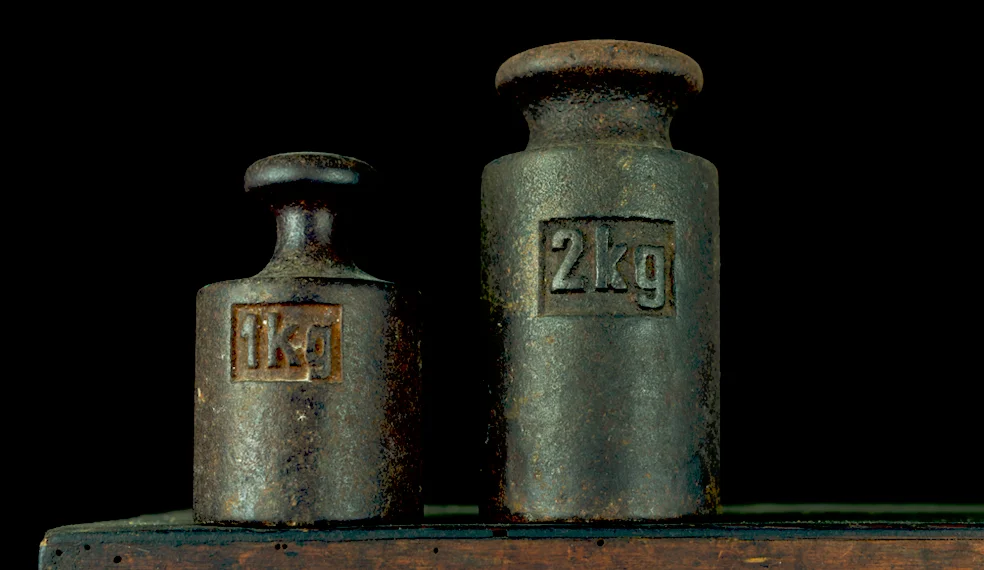


=

Or
pounds to kilograms conversion

M(lb)= M(kg) / 0.45359237
M(lb) = 84 / 0.45359237
M(lb) = 185.19

Mass is a key property of all matter. In physics, it's a quantitative measure of the "stuff" inside matter. In the perspective of physics, mass affects the change in speed and acceleration. For instance, if the mass of the object increases, by F = ma, it requires a larger force in order to acelerate this object to the same speed. To measure mass, we derive an international standard called the SI unit (International System of Units), and uses kilograms. Weight, however, is a different measurement. Weight relates to the force applied to the object due to gravity from the Earth. However, if we move this same object to the Moon or Jupiter, due to a different level of gravitational attraction, the weight will be different. In the Moon or Jupiter, however, mass in kilgrams will stay the same.
According to the SI unit, mass is measured in kilograms or in short form, kg.
If we use the physics perspective, there are different ways to measure mass. One is to use inertial
mass and the other, gravitational mass.
Inertial mass - according to Newton, inertial mass measures how strong an object resist acceleration, based on
the formula F = ma. What does this mean? It means that if the object has higher mass, then it requires a larger
force to accelerate its speed faster.
Gravitational mass - this is a measurement on how much gravity exerts in an object based on its mass. We can also
look at this, as how much an object experience the force of attraction by another object.
Weight is measured by the force of gravity on the object, however, the mass of an object will never change. For example, we weight different on the Earth and in outer space. Astronauts float around in space because there is no gravity in space, but it doesn't mean they don't have mass.
How do you measure mass accurately? In the micoscopic level, this is not easy. One of an effective method, is to use fluid inside a vibrating tube mass sensor. The lab tech first determines teh buoyant mass of an object using the fluid's density. The absolute mass of an object is determined by comparing the buoyant mass of this object in fluids of various densities. This is the easiest solution to determine the mass of bio objects, including embryos, cells and plant cells.
What if balance doesn't measure the mass of an object, as liquid? Well, people use transducers. This technology work by measuring the mass properties of the liquid in a static state. The mass of the liquid is measured, subtracting the mass of the vapour, the mass of a floating roof and the mass of the bottom sediment and water, then the gross mass is determined
Balance and scales are familiar to us in determining the mass of an object. A balance works by comparing an object with another with a
known mass. There are many types of balances, including beam balances, digital balances and others. The standard unit used in a typical
balance is gram or kilogram.
At home, when we determine our weight, we use either spring balance or a digital balance. In a bathroom scale, when a person stands
on the scale, the spring is calibrated so that the needle will move to the desired mass marking, based on the gravitational pull.
A digital scale works in similar fashion, which determines mass by taking the body weigth divided by gravity.

F = ma
Therefore, Weight = Mass x g
weight = mass x 9.8 m/s^2
1 centigram
1 decigram
1 gram
1 decagram
1 hectogram
1 kilogram
=
=
=
=
=
=
10 milligram
10 gram
10 decigram (dm)
= 1000 milligram
10 gram
10 decagram
10 hectogram = 1000
gram
IMPERIAL
1/2 oz
1 oz
2 oz
3 oz
4 oz
5 oz
6 oz
8 oz
10 oz
12 oz
13 oz
14 oz
15 oz
1 lb
METRIC
15 g
29 g
57 g
85 g
113 g
141 g
170 g
227 g
283 g
340 g
369 g
397 g
425 g
453 g
M(kg)= M(lb) x 0.45359237
M(kg) = 20 x 0.45359237
M = 9.07185
0.45359237 kilograms
No, 1 kilogram is equal to 2.20462262 pounds
1kg is heavier, since 1 kg = 2.2 pounds
Metric ton is the largest unti of mass.
An ounce is the smallest unit of weight.
The word "pound" is derived from ancient Roman, whereas Romans use to measure each unit of mass on libra pondo. This word means "a pound by weight." The English word pound takes the pondo part of the word, whereas the word "lb" is derived from the libra part of the word.